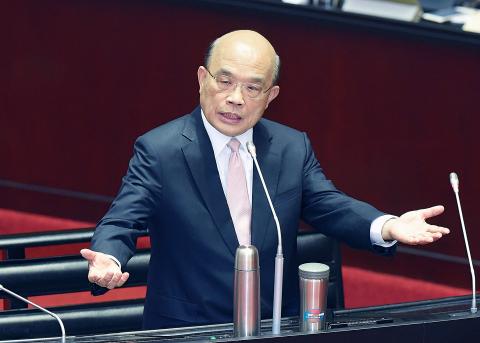“Kneeling before China and begging for mercy” would not make Taiwan better, Premier Su Tseng-chang (蘇貞昌) told lawmakers yesterday after one legislator asked him to respond to Taipei Mayor Ko Wen-je’s (柯文哲) criticism that cross-strait relations are at their worst in 30 years.
Despite the government’s efforts to extend goodwill, China has not renounced the use of force on Taiwan and is stepping up efforts to impose its “one country, two systems” framework on the nation, he said.
To safeguard Taiwan’s existence and protect its sovereignty and democracy, the government cannot comply with Chinese President Xi Jinping’s (習近平) proposals, he said, referring to Xi’s Jan. 2 speech warning that unification must be the ultimate goal of any talks between Taipei and Beijing.

Photo: Liao Chen-huei, Taipei Times
“If this has been said to be bad, we still have to hold the line,” the premier said.
Perhaps the best way to improve cross-strait relations would be “kneel down and give Taiwan to China,” Democratic Progressive Party (DPP) Legislator Cheng Pao-ching (鄭寶清) joked.
Nothing good would come of doing so, Su replied, citing the protests in Hong Kong.
“Look at what has become of Hong Kong after it was unified with China … from prosperity to turmoil,” he said.
“China promised it that nothing would change for 50 years [after Hong Kong’s handover in 1997]. Now, everything has been changed, just 20 years later,” he said.
Using a Chinese-language idiom, Su said “bowing and kneeling” to China would not make Taiwan any better.
Earlier in the day, when asked by DPP Legislator Lu Sun-ling (呂孫綾) about Chinese students and tourists vandalizing “Lennon walls” in Taiwan that support Hong Kong’s pro-democracy protests, Su said: “If they come here to commit a crime, we would immediately apprehend, investigate and deport them. This would serve them right.”
“We do not allow people living under Chinese autocracy to come here and not learn mutual respect from our democratic society, and to do something illegal to our democratic walls,” the premier said.
“Not only do we not welcome them, we will not allow them to be here,” he added.
In related news, President Tsai Ing-wen (蔡英文) told reporters who asked her about Ko’s comment that when it comes to cross-strait relations, it is not a question of good or bad, but an issue of national interests.
Her administration has adopted a rational stance toward cross-strait relations, as it has not provoked, nor made any rash moves, in the face of China’s constant encroachment, she said.
The government has been defending national interests and maintained normal interactions across the Taiwan Strait, while China chose to use its tourists visiting Taiwan for political purposes, she said.
Every government prioritizes its national interests when instituting policies and that is especially true for cross-strait relations, Tsai added.
Additional reporting by Lin Chia-nan

Alain Robert, known as the "French Spider-Man," praised Alex Honnold as exceptionally well-prepared after the US climber completed a free solo ascent of Taipei 101 yesterday. Robert said Honnold's ascent of the 508m-tall skyscraper in just more than one-and-a-half hours without using safety ropes or equipment was a remarkable achievement. "This is my life," he said in an interview conducted in French, adding that he liked the feeling of being "on the edge of danger." The 63-year-old Frenchman climbed Taipei 101 using ropes in December 2004, taking about four hours to reach the top. On a one-to-10 scale of difficulty, Robert said Taipei 101

A preclearance service to facilitate entry for people traveling to select airports in Japan would be available from Thursday next week to Feb. 25 at Taiwan Taoyuan International Airport, Taoyuan International Airport Corp (TIAC) said on Tuesday. The service was first made available to Taiwanese travelers throughout the winter vacation of 2024 and during the Lunar New Year holiday. In addition to flights to the Japanese cities of Hakodate, Asahikawa, Akita, Sendai, Niigata, Okayama, Takamatsu, Kumamoto and Kagoshima, the service would be available to travelers to Kobe and Oita. The service can be accessed by passengers of 15 flight routes operated by

Taiwanese and US defense groups are collaborating to introduce deployable, semi-autonomous manufacturing systems for drones and components in a boost to the nation’s supply chain resilience. Taiwan’s G-Tech Optroelectronics Corp subsidiary GTOC and the US’ Aerkomm Inc on Friday announced an agreement with fellow US-based Firestorm Lab to adopt the latter’s xCell, a technology featuring 3D printers fitted in 6.1m container units. The systems enable aerial platforms and parts to be produced in high volumes from dispersed nodes capable of rapid redeployment, to minimize the risk of enemy strikes and to meet field requirements, they said. Firestorm chief technology officer Ian Muceus said

MORE FALL: An investigation into one of Xi’s key cronies, part of a broader ‘anti-corruption’ drive, indicates that he might have a deep distrust in the military, an expert said China’s latest military purge underscores systemic risks in its shift from collective leadership to sole rule under Chinese President Xi Jinping (習近平), and could disrupt its chain of command and military capabilities, a national security official said yesterday. If decisionmaking within the Chinese Communist Party has become “irrational” under one-man rule, the Taiwan Strait and the regional situation must be approached with extreme caution, given unforeseen risks, they added. The anonymous official made the remarks as China’s Central Military Commission Vice Chairman Zhang Youxia (張又俠) and Joint Staff Department Chief of Staff Liu Zhenli (劉振立) were reportedly being investigated for suspected “serious